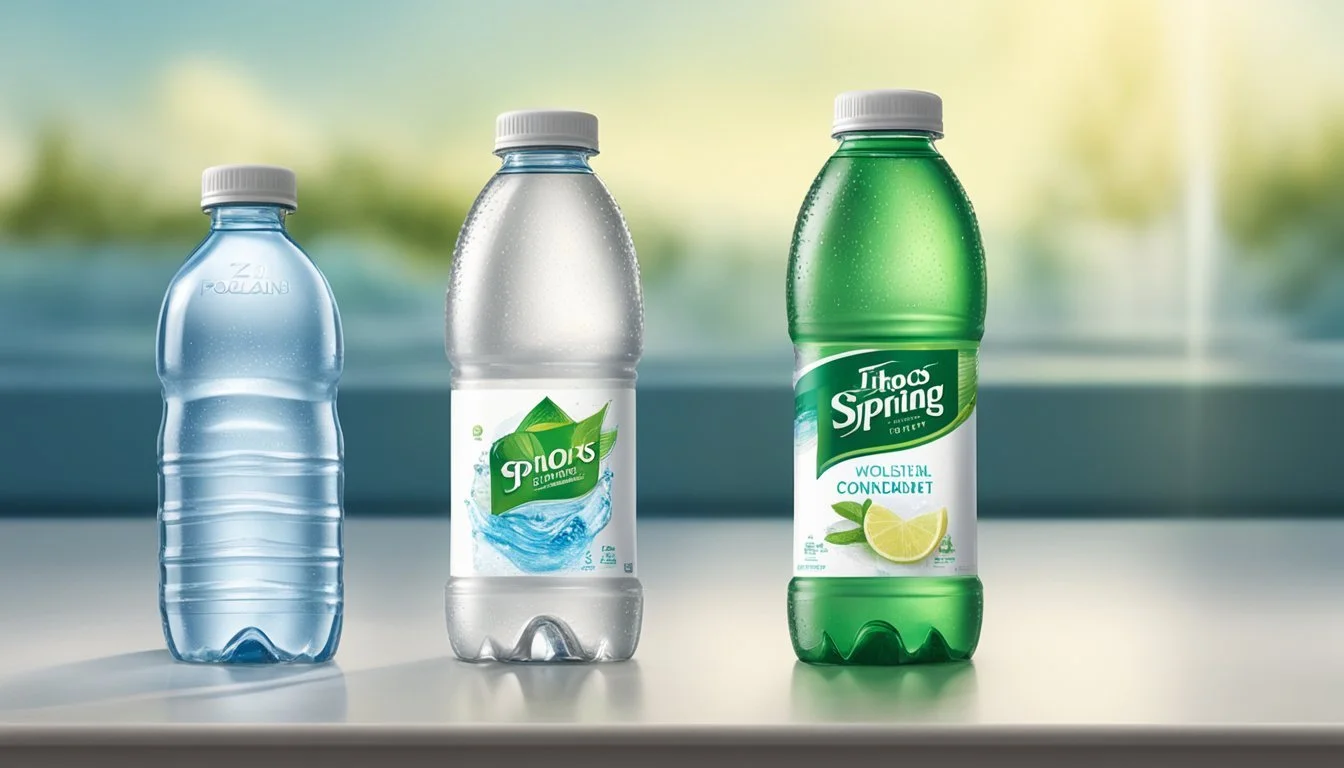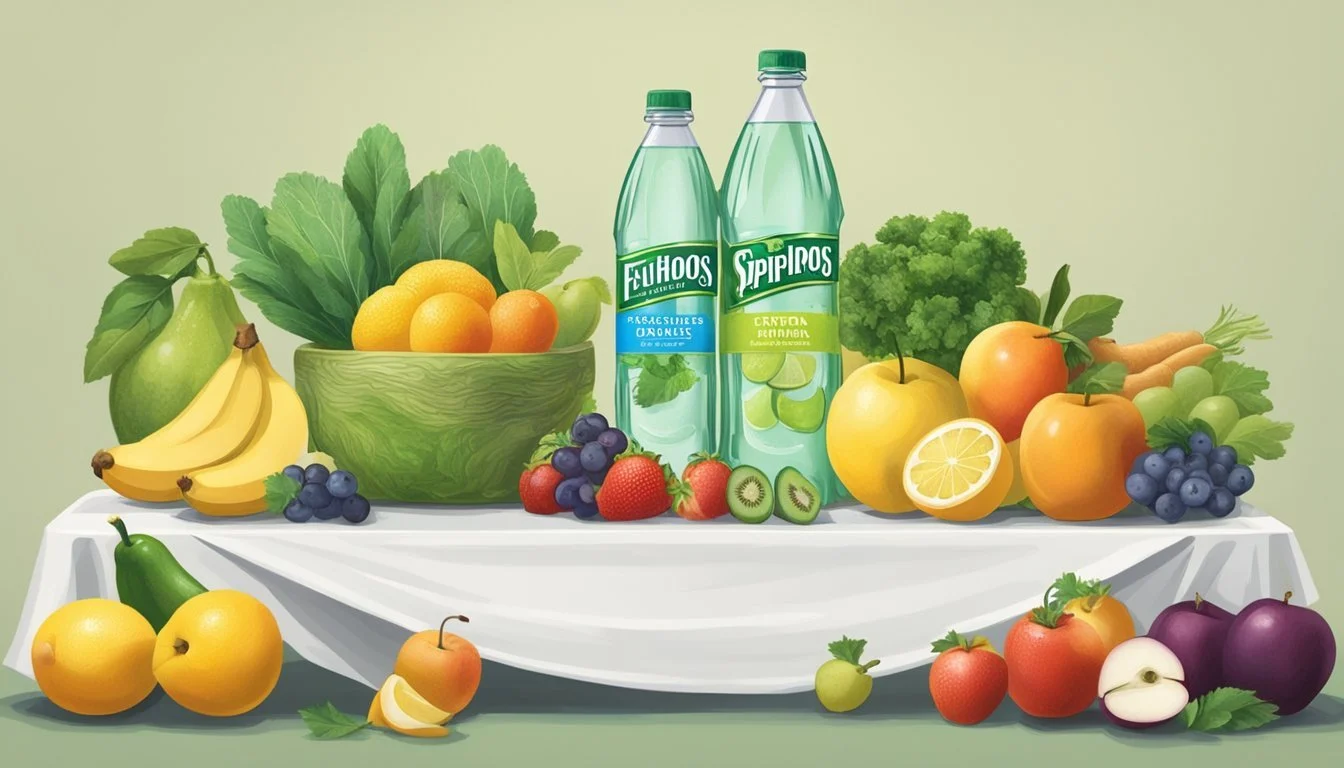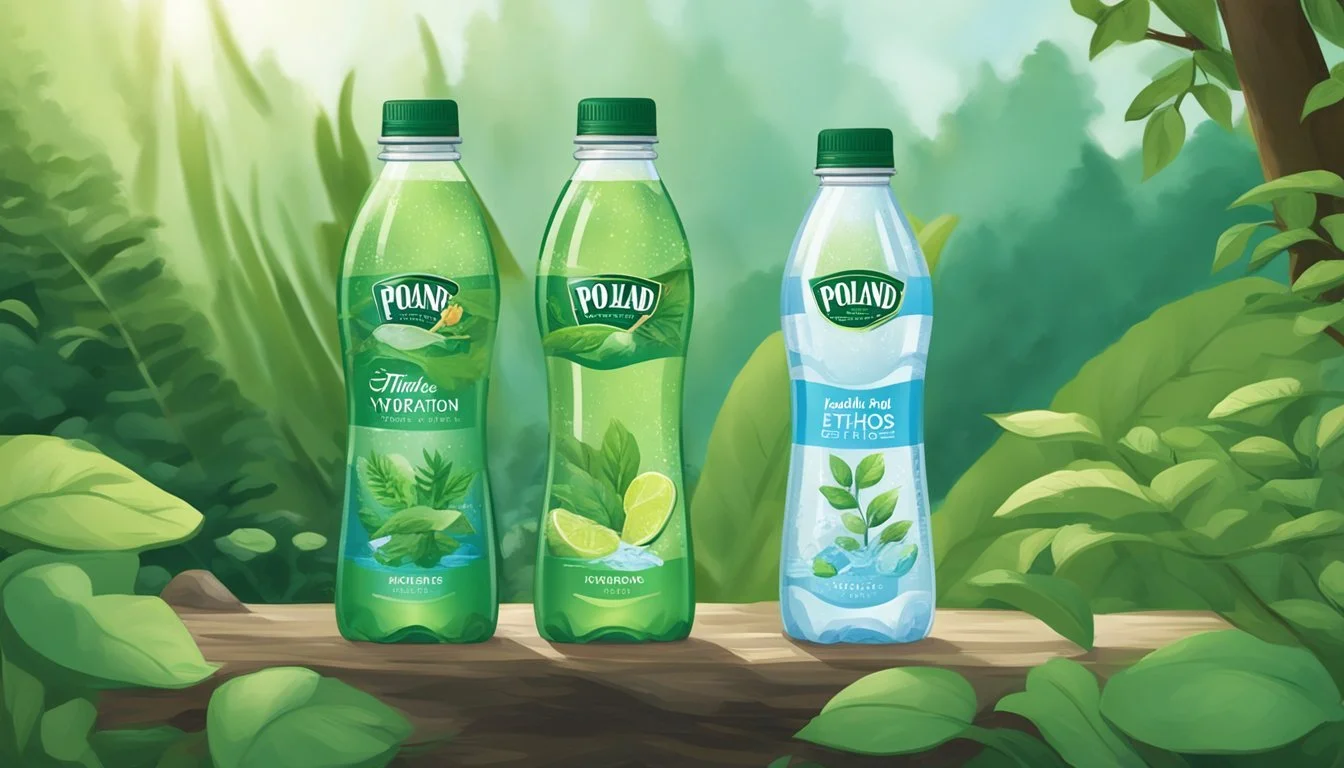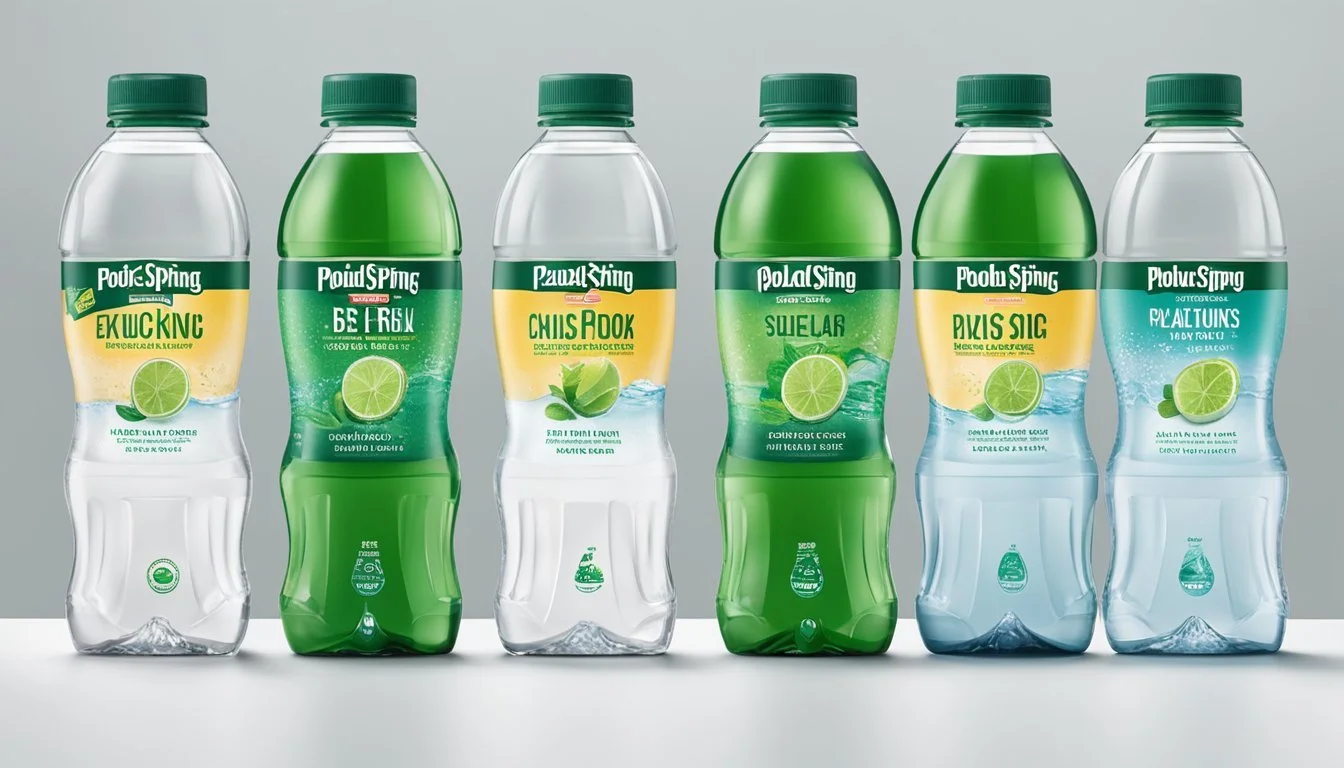Ethos vs. Poland Spring
A Comparative Analysis of Bottled Water Brands
In the realm of bottled water, consumer choices often come down to more than just taste. Factors such as sourcing, purity, and brand ethos play significant roles in the decision-making process. Ethos Water and Poland Spring represent two prominent brands in the bottled water market, each with its own narrative and consumer appeal. Ethos Water, with its pledge to contribute to humanitarian water programs, presents itself as a socially responsible choice. In contrast, Poland Spring emphasizes its regional heritage and natural sourcing from Maine.
However, recent scrutiny over the authenticity of source claims and the overall quality of bottled water has put these brands in the spotlight. Poland Spring has faced allegations challenging the veracity of its "100% Natural Spring Water" label, prompting questions about transparency in the industry. Ethos Water, owned by Starbucks, has built a brand on charitable giving, promising to help provide clean water to people in need with each purchase. This commitment to global water issues adds an ethical dimension to the consumer's choice.
As consumers weigh the importance of brand mission alongside product quality, the debate between Ethos vs. Poland Spring becomes a reflection of individual values and priorities. The taste, the source of the water, and the impact of their purchase on the wider world are all factors that can influence their decision on which bottled water is better suited to their needs.
Understanding Bottled Water
Bottled water comes in various forms, from spring water to mineral water and purified water. They differentiate by source and treatment, which affects their content and taste.
Spring water is collected from natural underground sources and must flow naturally to the earth's surface. Poland Spring asserts its water originates from such springs in Maine, gaining minerals as it flows. However, its source and naturalness have been contested.
Mineral water, unlike other types, contains a consistent level of naturally occurring minerals. Agencies such as the FDA mandate that it must have at least 250 parts per million of trace minerals, which impart a distinctive flavor profile.
Purified water undergoes processes such as reverse osmosis, distillation, or deionization. The objective is to remove impurities and contaminants transcending levels typically found in tap water.
Water Type Typical Source Processing Regulatory Example Spring Water Underground aquifer Minimal, natural flow Poland Spring Mineral Water Natural springs Natural minerals, no added FDA guidelines Purified Water Mixed sources Advanced filtration EPA standards
Tap water, universally accessible, is regulated for safety and may sometimes surpass bottled water in quality tests. It is notable that some bottled waters, like Ethos, may actually source from municipal supplies.
To summarize, consumers should scrutinize bottled water labels to understand what they are drinking, considering the source and the purification methods employed. They can then align their choice with taste preferences or specific mineral content they seek.
Ethos Water: Brand Overview
Ethos Water is an American bottled water. It positions itself not only as a provider of refreshment but also as a brand on a mission. Founded in 2001, Ethos Water was devised as a socially responsible effort to provide children around the world with access to clean water.
The brand’s impact goes beyond the bottle, with a portion of its profits directed to various water programs. Each purchase contributes to global humanitarian efforts, embodying Ethos Water's commitment to 'helping children get clean water.'
Regarding the quality and taste of their bottled water, Ethos maintains that it provides a pure and refreshing taste. While specific details on the mineral content and pH level of Ethos Water are not highlighted in public resources, bottled waters generally have varying levels of minerals that can affect both pH and taste. Ethos Water likely matches industry standards for bottled water, ensuring that it meets regulatory requirements for quality.
In terms of benefits, the choice of Ethos Water supports not only hydration needs but also contributes to the greater good. This dual purpose might appeal to consumers who prefer products that come with charitable giving.
Nutritional Content at a Glance:
Minerals: Standard levels for bottled water
pH: Likely around neutral (specifics not publicly disclosed)
Taste: Marketed as pure and refreshing
It's important to consider these factors when choosing Ethos Water, keeping in mind both its social mission and the product itself.
Poland Spring: Brand Overview
Poland Spring is a prominent brand in the bottled water market, originating from multiple sources in the state of Maine. These sources include a natural spring in Poland, Maine, known as Poland Spring, as well as several supplementary springs such as Garden Spring, Cold Springs, and Clear Spring, among others.
The brand emphasizes its commitment to providing natural spring water. The water is collected from carefully selected aquifers which are thought to be replenished by rainwater filtering through layers of sediment and absorbing minerals from the surrounding environment, including limestone formations. The presence of these natural minerals can contribute to the quality and taste of the water.
Poland Spring water undergoes rigorous testing to ensure it meets high purity standards. The water's pH balance and mineral content are regularly monitored, and the company makes an effort to maintain consistency in the composition and taste of their bottled product.
Here are some key attributes of Poland Spring water:
Attribute Description Source Natural springs in Maine Aquifer Replenished by natural filtration Limestone Contributes to mineral content Quality Regularly tested for purity and consistency Minerals Contains natural minerals from its source pH Level Balanced to maintain a neutral taste
Poland Spring presents itself as a provider of water that's not only refreshing but also aligns with consumers’ expectations for naturalness in their drinking water. The brand's longevity and consumer trust have helped to solidify its position in the bottled water industry.
Water Source and Quality Analysis
In evaluating Ethos and Poland Spring bottled waters, it is essential to consider the source and composition of the water, which contributes to overall quality. This section dissects components like source type, mineral content, and purity that play vital roles in defining the superiority of bottled water brands.
Natural Spring vs. Purified Sources
Ethos Water primarily sources its product from public water systems or tap water before purification. Conversely, Poland Spring claims its water comes from carefully selected natural springs in Maine, such as Poland Spring and Garden Spring. The distinction is significant as natural spring water generally flows to the surface from a clean groundwater aquifer and may contain naturally occurring minerals.
Minerals and PH Levels
Mineral content such as calcium, magnesium, and electrolytes contributes to the taste and health benefits of bottled water. Poland Spring, as a natural spring water, typically has a varied mineral content depending on the source spring. Ethos Water undergoes a multi-step filtration process, potentially including reverse osmosis and distillation, which strips the water of most minerals, although some may be added back to achieve a desired mineral content and pH level. Typically, natural spring waters like Poland Spring are more likely to have a higher pH level, resulting in slightly alkaline water, compared to purified water brands.
Contaminant and Purity Considerations
Both Ethos and Poland Spring adhere to the EPA and FDA standards for contaminants. Ethos Water undergoes extensive filtration to remove substances like lead, chlorine, fluoride, and heavy metals, ensuring its purity. Poland Spring must meet stringent regulations for groundwater quality, testing for contaminants like BPA from the bottling process. The purity of Poland Spring is also attested by multiple quality reports and tests for a wide array of substances, ensuring the absence of harmful contaminants.
Environmental Impact and Sustainability
Evaluating bottled water brands like Ethos and Poland Spring requires an analysis of their environmental footprint, centered on their production processes, recycling efforts, and the sustainability of their water sources.
Bottle Production and Recycling
Ethos Water claims that it uses BPA-free plastic for its bottles, which is a selling point for consumers concerned about chemical leaching. However, although BPA-free, the environmental impact still hinges on the production and end-of-life management of these plastic bottles. Ethos emphasizes that part of their profits go toward water and sanitation programs, indirectly addressing sustainability concerns.
Poland Spring, on the other hand, was reported to aim for their Poland Spring brand to use 100 percent recycled plastic by 2022. This initiative demonstrates a conscious effort to lessen the environmental burden by reducing the dependency on new plastic production and encouraging recycling.
Water Extraction and Ecosystem
The extraction of water for both Ethos and Poland Spring raises questions about the impact on aquifers and groundwater supplies. Ethos sources its water from public water systems, while Poland Spring's marketing has historically emphasized its natural spring source.
Poland Spring has faced scrutiny over the authenticity of its claims regarding the natural spring source, with allegations that its water may not come from the advertised springs themselves. The brand was also mentioned for allegedly lobbying against environmental regulations that would impact their access to these sources. The access to freshwater nationwide, the extraction process, and its effects on the ecosystem must be assessed carefully to ensure long-term sustainability and minimal impact on the environment.
Both brands' practices potentially affect surrounding ecosystems through the depletion or alteration of natural water repositories. These actions can in turn have a significant impact on local aquifers and groundwater levels, and consequently on the broader environment. The commitment to sustainable practices in the face of these concerns is crucial for the long-term viability of the bottled water industry.
Taste Profile and Comparison
When analyzing bottled water, consumers often consider taste as a significant factor. Ethos and Poland Spring represent two notable brands in the bottled water market, each with its distinct taste profile.
Ethos Water boasts a smooth and clean flavor. It is often described as having a neutral pH balance, which may contribute to its pure taste devoid of any heavy mineral overtones. Ethos not only emphasizes taste but also aligns with a social cause, providing a portion of its profits to water-related humanitarian projects.
Poland Spring, originating from Maine, claims a crisp and refreshing taste. This brand sources its water from carefully selected natural springs, which may add to the mineral content influencing its taste. In taste tests, many consumers discern a slight difference due to this mineralization, which can provide a characteristic edge that some might prefer over the softer taste of purified waters like Ethos.
Below is a brief comparison of the taste and mineral content:
Feature Ethos Water Poland Spring Taste Neutral Crisp Mineral Content Low Higher Source of Water Various Natural springs Aftertaste Absent Noticeable
It is important to understand that perception of taste is subjective and can be influenced by individual preferences. Some might opt for the neutrality of Ethos if they prefer water without a noticeable mineral flavor. In contrast, others might favor the natural spring taste that Poland Spring delivers, often associated with a slight mineral aftertaste. The choice between these two brands ultimately depends on personal taste preferences and the desired mineral content of the water one enjoys.
Health and Hydration
The focus of this section is to examine the role of hydration and electrolytes in the context of bottled water, particularly Ethos and Poland Spring, alongside considerations of water safety and treatment processes.
Hydration and Electrolytes
Hydration is critical to maintaining bodily functions, and it's primarily achieved through the consumption of water. Bottled waters, like Ethos and Poland Spring, have distinct profiles when it comes to electrolytes, which are minerals in water that are essential for hydrating the body. Ethos water is often marketed for its additional electrolytes, which can have benefits for rehydration. Meanwhile, Poland Spring, categorized as a natural mineral water, originates from springs and naturally contains some minerals.
Ethos: Enhanced with added electrolytes; aimed at optimal hydration.
Poland Spring: Natural mineral composition contributes to hydration.
Water Safety and Treatment
When considering water safety and treatment, both Ethos and Poland Spring are subject to regulation by the FDA, ensuring they meet minimum safety standards. Ethos water generally undergoes a process of purification, including reverse osmosis and ozonation, a disinfection method where ozone is used to kill bacteria without leaving harmful residues.
Ethos: Treated with purification techniques like reverse osmosis and ozonation.
Poland Spring: Sourced from springs and subjected to filtration and disinfection to meet EPA standards.
Poland Spring's source is springs, and it undergoes filtration and UV light treatment to ensure the removal of pathogens. Both brands adhere to stringent safety protocols to maintain water quality and hydration efficacy.
Brand Reputation and Consumer Trust
The credibility of a bottled water brand is often assessed by its market presence and how it responds to legal challenges. These factors significantly influence consumer trust and preference.
Market Presence and Consumer Choice
Both Ethos Water and Poland Spring have established significant market presence, but they cater to different consumer bases. Ethos Water, owned by Starbucks, is positioned as a socially responsible brand, promising to contribute a portion of each sale to water-related humanitarian projects. This brand sits alongside premium bottled waters like Fiji, Voss, and Icelandic Glacial, appealing to consumers who are willing to pay a premium for both quality and brand ethos.
In contrast, Poland Spring is a Nestlé-owned brand known for its regional heritage. It competes directly with widely available brands such as Dasani, Aquafina, and Smartwater. Poland Spring's trust comes from its longstanding reputation as a natural spring water, which aligns with brands like Evian and Perrier. Both Ethos Water and Poland Spring benefit from consumer preferences that tend toward established brands that convey safety, consistency, and social accountability.
Legal Challenges and Transparency
Legal issues can undermine consumer trust and damage a brand's reputation. Poland Spring has faced class-action lawsuits questioning the authenticity of its 'spring water' claim. Transparency and truth in labeling are pivotal points of contention, as seen with challenges to other brands like Aquafina and Dasani, which had to clarify their processes of municipal sourcing and purification.
Ethos Water has not faced such legal scrutiny. However, its affiliation with a large corporation like Starbucks means that its social responsibility claims are subject to significant consumer expectations and inspection. The credibility of Ethos Water's commitments to humanitarian efforts is vital for maintaining its brand reputation.
For bottled water brands, addressing and resolving legal disputes transparently is crucial to maintaining public trust. This is especially pertinent given the increasing consumer demand for accountability across all product categories.
Packaging and Accessibility
When comparing Ethos and Poland Spring bottled waters, their packaging and accessibility are key factors for consumers. Both brands offer their water in plastic bottles, but the materials and designs may impact user preference.
Ethos Water presents itself with a clear, simplistic design, typically in single-serving bottles that are convenient for on-the-go consumption. Ethos bottles are also BPA-free, mitigating consumer concerns about Bisphenol A, which some researchers suggest can seep into food and drinks causing potential health effects.
On the other hand, Poland Spring often emphasizes its regional heritage, with labels reflecting its Northeastern U.S. origins. Like Ethos, Poland Spring offers BPA-free bottles, a significant consideration for health-conscious buyers. The brand provides a range of sizes from small, portable bottles to larger multi-gallon formats that cater to varying needs, from individual use to family-size consumption.
Accessibility is a strong point for both brands, as they are widely available in supermarkets, convenience stores, and vending machines. This easy availability makes both Ethos and Poland Spring practical choices for consumers seeking hydration options that are easy to find.
Ethos Water:
BPA-free plastic
Single-serving size
Simplistic design
Poland Spring:
BPA-free plastic
Multiple sizes available
Heritage-themed design
While neither brand offers boxed water, which is an alternative packaging solution growing in popularity due to its lower environmental impact, they have made efforts to make their plastic bottles recyclable. Consumers looking for convenience and availability will find both Ethos and Poland Spring meet their needs, with packaging that is both portable and safe for consumption.
Cost Comparison and Value
When considering bottled water options, shoppers often evaluate the cost-effectiveness and practicality of their choice. Ethos and Poland Spring cater to different segments of the market, each with unique pricing structures and retail availability which are crucial for customers prioritizing value and convenience.
Price Point and Economy Size Options
Ethos Water typically maintains a higher price point due to its brand positioning and social initiative, as part of its profits is pledged to humanitarian water programs. Even though it may not offer a wide range of economy size options, customers might find value in supporting Ethos's charitable cause.
In contrast, Poland Spring offers a more competitive pricing strategy, making it an affordable choice for a larger customer base. It provides a variety of pack sizes, including economy options, which cater to customers seeking convenience and value in bulk purchases.
Ethos Water: Often positioned as a premium brand with limited bulk options.
Poland Spring: Known for its range of pack sizes catering to both individual and bulk buyers.
Availability and Retail Presence
Poland Spring has a strong retail presence, being widely available in various supermarkets and convenience stores across the Northeastern United States. The brand's extensive distribution network ensures that it is accessible to a broad demographic, which can translate to convenience for the shopper.
Ethos Water, on the other hand, is commonly found in Starbucks locations as it is owned by the coffee giant. While its availability might be narrower in scope compared to Poland Spring, it can be easily purchased where its retail rights-holder has a presence.
Ethos Water: Sold primarily in Starbucks stores and online platforms.
Poland Spring: Extensively available in supermarkets and vending machines in its distribution areas.
Competitor Analysis
In the bottled water market, Ethos Water and Poland Spring distinguish themselves through brand differentiation and unique selling propositions. This section explores their positioning relative to major competitors and highlights what sets them apart.
Comparison with Other Popular Brands
Ethos Water and Poland Spring compete with several well-established brands, including but not limited to Dasani, Aquafina, and Nestlé Pure Life. Dasani and Aquafina, owned by Coca-Cola and PepsiCo respectively, hold significant market share with their widespread distribution networks. Nestlé, another primary competitor, offers multiple products like Nestlé Pure Life, and boasts a global presence. Here's how Ethos and Poland Spring stand in comparison:
Brand Owner Distinctive Quality Ethos Water Starbucks Corporation Social impact—supporting water access Poland Spring Nestlé Company Natural source—Maine spring water Dasani Coca-Cola Mineral-enhanced for taste Aquafina PepsiCo Purified through reverse osmosis Nestlé Nestlé Company Wide reach, offering several bottled waters
Unique Selling Propositions
Ethos Water appeals to consumer altruism, with a business model that includes donating a portion of each sale to support global water programs. Their unique selling proposition stems from their social impact initiative and commitment to providing vapor-distilled water.
Conversely, Poland Spring emphasizes its origins, delivering water sourced from springs across Maine, which it promotes as 100% natural spring water. Poland Spring's differentiation lies in its natural source appeal and long-standing reputation within the Northeastern US.
Both brands leverage their unique aspects to capture distinct segments within the bottled water market. Ethos Water's approach resonates with socially-conscious consumers, whereas Poland Spring draws customers seeking a natural and regionally-sourced product.
Final Verdict
When it comes to choosing between Ethos and Poland Spring bottled waters, consumers often consider factors like taste, source, purity, and brand reputation.
Ethos water, with its commitment to charitable causes, donates a portion of its profits to water access initiatives. It sources its water responsibly and provides a clean, crisp taste.
Poland Spring, on the other hand, boasts a long history dating back to the 1800s and claims to source its water from natural springs in Maine. However, it has faced lawsuits over the presence of microplastics and the authenticity of its spring sources.
Aspect Ethos Poland Spring Taste Crisp Standard Source Various Springs in Maine Social Impact Charity Donations None Notable Purity Concerns Fewer Reports Microplastics Lawsuit
Given the information:
One should note that Ethos offers not only a palatable product but also enhances its appeal with its ethical dimension.
Poland Spring maintains a strong market presence, but concerns over water quality could affect one's preference.
In conducting a taste test, individual preferences will vary, but Ethos often receives praise for its flavor profile.
Considering all these aspects, the recommendation leans towards Ethos as the better choice for those who value both taste and social responsibility in their purchasing decisions. They present a compelling package of refreshing bottled water coupled with a positive social impact.









